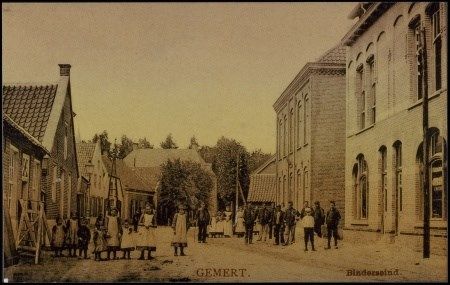Marechausseekazerne | Gemert
Contact
Binderseind 18- 20a
5421 CJ Gemert Plan your route to Marechausseekazerne | Gemert
This building was home to the Gemert Marechaussee from 1897. It came to Gemert in a hurry in 1849 to start the weavers' rebellion first by arr…
This building was home to the Gemert Marechaussee from 1897. It came to Gemert in a hurry in 1849 to start the weavers' rebellion first by arresting one of the weavers, and then suppressing it with 115 troops who arrived from Eindhoven. These were the famine years and things were not quiet among the peasantry either, for example, there were riots at the annual leasing of the tithes and prospective tenants were threatened with arson. Earlier recommendations had been made to send troops to a turbulent community like Gemert. Revolutions also broke out throughout Europe; the first stirrings of communism came blowing in from Prussia. The medieval tithing system had been reintroduced after the departure of the French and, as mentioned, proved to be very unpopular. After the new (liberal) constitution was adopted and times became brighter again the unrest subsided, but in Gemert the Marechaussee did not leave again until 1925. The Marechaussee is actually a police force belonging to the army. In many villages they were stationed alongside the field constables who scoured the countryside to catch poachers and the like.
Often there was no regular police force then. This was advantageous in "troubled" areas because the State Police did not live at home but in a barracks and could be called in the middle of the night. In the first months, these foreigners were not so popular and people still took their recourse to the mayor who used to draw up the police reports and the like. But we can see from newspaper reports in the late 19th century that this passed.
7-2-1891 There was laundry stolen, it was found by the military police in the back of a cart trying to leave the municipality. They arrested the suspects.
15-2-1899 A boy of 14 had stolen 19 guilders from a factory worker. Much of it had been spent on candy but the rest was hidden in his neighbor's manure pile and recovered by the military police, after arresting the boy.
By the end of their time in Gemert they had become, at least with some, well-liked as this speech by the pastor at their farewell shows:
They did a lot of good here. And it is mainly due to the fact that there was a barracks here if we may testify that the Gemert region is a quiet one so that gross wantonness, street vandalism and delinquency is practically unknown here. We greatly regret the closing of the barracks: twice the entire clergy of the area under the guard of the Gemert brigade has appealed: but we have received 'zero response' in the true sense of the word. To the men: "Farewell and Godspeed."
Their duties were taken over by the regular police.
Sources:
A. Otten, Vestiging en Vertrek van de Marechausseekazerne, 1849-1924, 1986,Gemerts Heem, Heemkundekring de Kommanderij, Gemert
H. Giebels, The Gemert weavers' revolt of 1849: Gemert around the middle of the 19th century, 1999, Heemkundekring de Kommanderij, Gemert
P. Lathouwers, Gemerts Nieuws 1881-1900: messages from the Zuid-Willemsvaart, 1981, Heemkundekring de Kommanderij, Gemert

